11 reasons every beginner guitar player should take lessons
We truly believe that investing in structured guitar lessons is the best way to improve as a player – and here's why
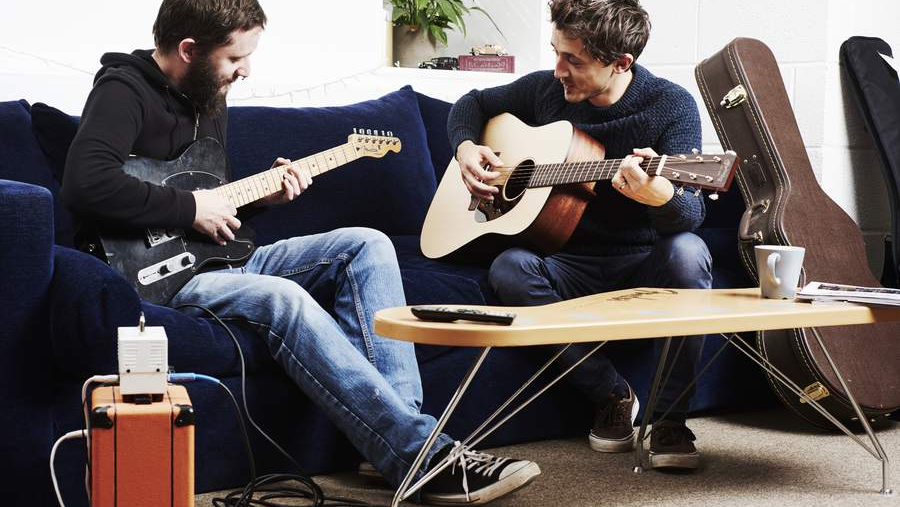
We love to imagine that guitar gods are gifted their talent in a pact with the Devil, rather than having to sit through years of guitar lessons. After all, education is hardly rock n’ roll, is it?
There is YouTube, that bottomless pit of guitar tutorials. Sure, it’s never been easier to teach yourself how to play the guitar, yet it’s also never been harder to know where to start. That’s why we believe that lessons are the best way to learn, a process that will see you progress further faster with more fun and far fewer frustrations. They’re the best shortcut you can take to becoming well, if not a guitar god, then at the very least a musician worthy of the title guitarist.
In fact, the novice attrition rate is so high – research in 2019 by Fender discovered a 90% abandonment rate within a year – that taking lessons could be the one thing that saves you from jacking the whole guitar thing in and taking up golf. Which really would be the work of the Devil.
While it’s almost certainly true that Clapton, Hendrix and BB King, together with quite a few others from that era, were self-taught, just think how much smoother their journey to greatness would have been had they had guitar lessons.
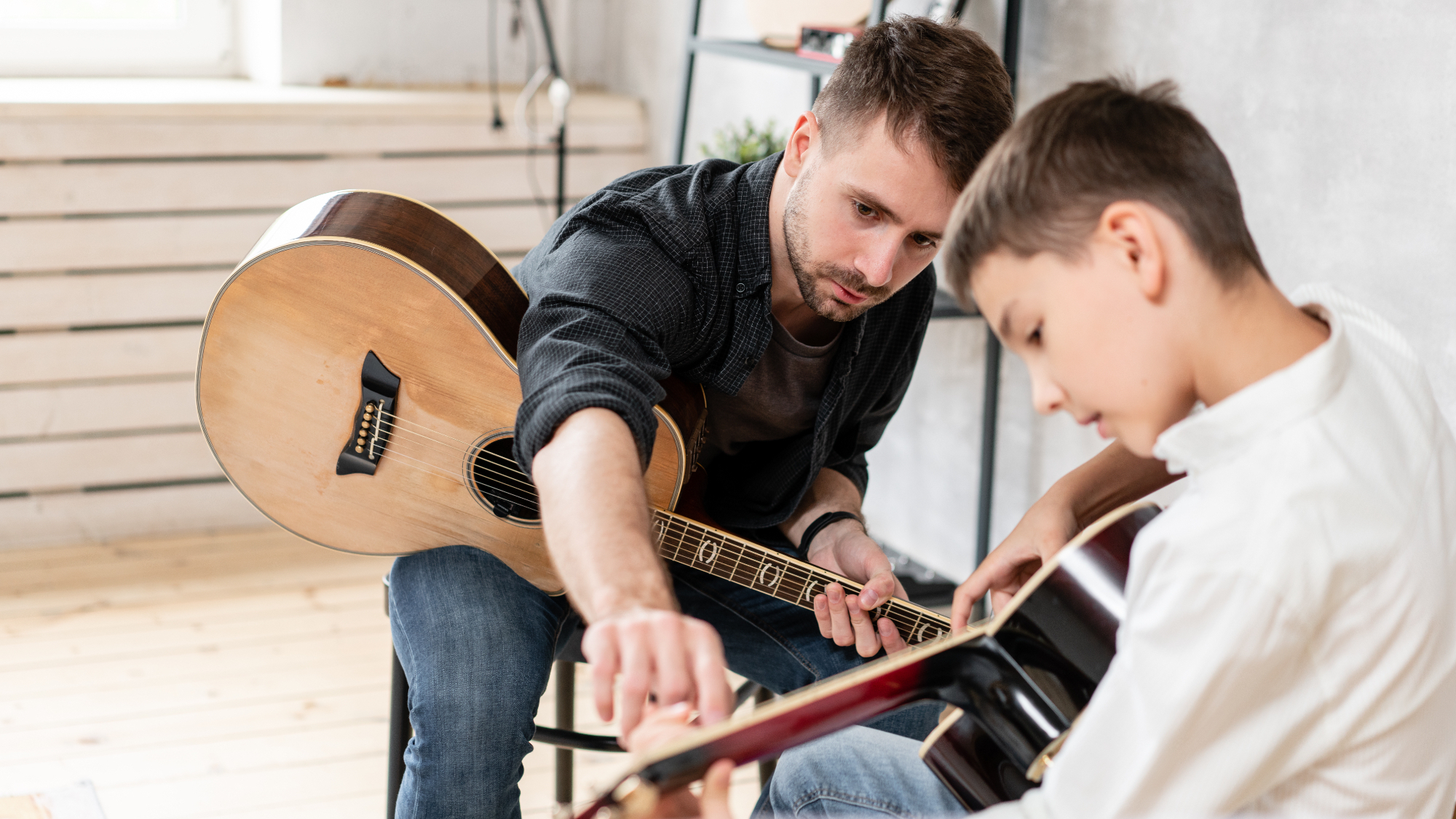
1. Lessons are more affordable than you think
While we’re not in favor of skipping about the internet without focus – watching a little bit of everything but learning a whole lotta nothing – there’s nothing wrong with online learning, provided it has structure.
Free sites, such as JustinGuitar.com, or paid-for online guitar lessons, like Guitar Tricks, Yousician, Fender Play or Simply Guitar, enable you to learn at a fraction of the cost of attending one-to-one, face-to-face lessons with a real teacher. Whether they are better value or not depends on the preferred learning style of the student, as well as the proficiency of the teacher.
Subscriptions to these online tools cost around $/£100 - $/£150 per year, which isn’t an insignificant amount, but it probably works out at less than the cost of four hours of one-to-one tuition. Either route will enable you to explore the true value of your guitar.
Get The Pick Newsletter
All the latest guitar news, interviews, lessons, reviews, deals and more, direct to your inbox!
2. Guitar teachers ain’t what they used to be
Paul McCartney famously tells the story of how, when he was a teenager, he traveled across Liverpool by bus just to meet a guy who could show him how to play a B7 chord. Back in the day, good guitar teachers were thin on the ground. Invariably, they were either a grumpy old dude in the local music store who knew a handful of chords and one position of the minor pentatonic scale, or a terrifyingly strict classical guitar type with zero tolerance of ‘popular’ music.
Today, the variety of genres available to learn from one-to-one tuition is staggering. If qualifications are your thing, some teachers will offer curriculums in rock and other contemporary styles. Gone is the stuffiness of yesteryear, replaced by teachers and learning paths that enable you to play music that’s relevant and enjoyable to you and your peers.

3. Structured learning motivates you for success
Many beginner guitarists give up within months because they lose the will to keep practicing. Often, this isn’t because practicing is particularly demanding, it’s because they’re making little meaningful progress. The dream of mastering the guitar, an aspiration that once burned with such an incandescent flame, is suddenly dulled. Why the loss of appeal? Because there’s no structure. Grabbing an Oasis riff here, and a fragment of a Guns N’ Roses solo there, may be fun for a while, but it isn’t going to help you progress much as a musician in the long term. Before you know it, you’re glued to your phone again.
A teacher, whether that be an app or a human, can set you on a pathway paved with realistic goals. You’ll benefit from a roadmap of specific, measurable and attainable skills to learn, reinforce and re-apply in the future, giving you the best possible foundation on which to build success. Better still, the sense of achievement you’ll earn every step of the way will keep you coming back for more, making it almost impossible to quit.
4. A good teacher teaches you accountability
How many times have we promised ourselves that we’re going to act, only to renege on that promise just hours later? If you’re anything like me, I suspect it’s quite often. However, if you promise somebody else that you’re going to act, especially somebody who’s relying on you to come through, then I bet you rarely let them or yourself down. Sharing our ambitions with another person, so that we become more accountable to them, is a sure-fire way to maintain drive.
Employing a teacher adds an additional layer of accountability that makes practice non-negotiable.
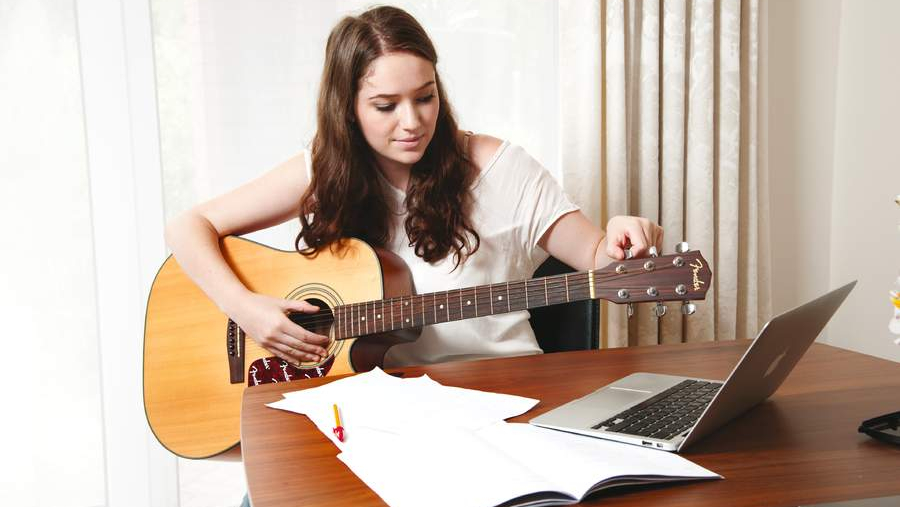
5. Nip bad habits in the bud
Bad habits wreak havoc on your chances of developing a sublime guitar tone. Poor posture, excessive tension, lousy dynamics, floating your fingers way above the fretboard, inaccurate fretting, bad muting technique, mediocre picking technique and failure to bend to the correct pitch are just a few of the no-nos that directly affect your guitar’s sound.
Sadly, many beginners, and even intermediate guitarists, are oblivious to the fact that their playing is being spoiled by one or more of these common faults.
It’s a tricky area of learning, where few of us have the necessary levels of self-awareness or comprehension, which is why a good face-to-face teacher is so invaluable. They can observe, diagnose, foster good habits and prevent bad ones from forming, all within the course of a lesson.
Remember, it’s much harder to break a bad habit than avoid it in the first place.
6. Timing is everything
You can achieve a great deal with books and YouTube tutorials, but they’ll do almost nothing to help you with music’s most critical component – timing. Many guitarists, particularly those who learn in isolation at home, are truly awful at playing in time. Left to their own devices, they may eventually be able to play some obscure chords and a difficult solo or two. But in a group with other musicians? Their playing will likely prove disconnected and chaotic.
Issues such as playing ahead, playing behind, speeding up through the course of a song or completely mistiming some notes within a phrase, are all very common. Fortunately, under the watchful eye of a guitar teacher, timing can be greatly improved with exercises such as duets and simple jam sessions.
Gamified apps that feature animated fretboards are also useful at teaching novice guitarists to play in time.
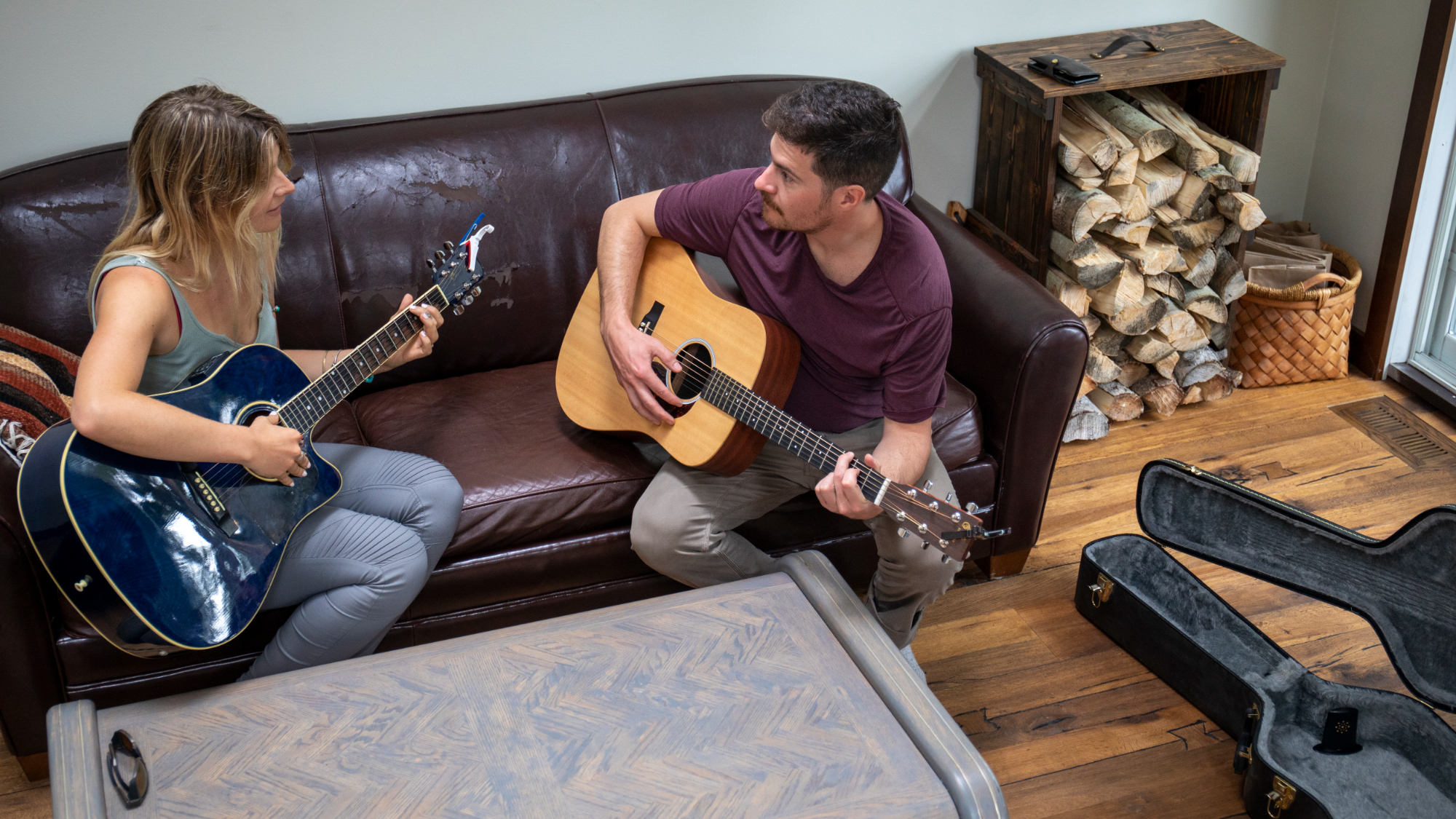
7. Feedback is instantaneous
Learning on your own is a lonely pastime, one that’s often plagued with self-doubt. ‘This sounds off, am I playing it right?’ ‘Is this chord really the correct one?’ ‘How on earth do I reach that fret when the rest of my fingers are still tied up further down the neck?’
A teacher will provide instant feedback, readily pointing out which parts you’re playing well, and which parts need more work. Importantly, they’re on hand to help you through the passages that require more explanation or attention.
One of the most frustrating parts of learning any instrument is that many solutions only appear blindingly obvious after someone else has pointed them out. Having a teacher can save an awful lot of time that would otherwise be wasted on simple, yet exasperating, problems.
8. Navigating plateaus
Learning to play the guitar is rarely a linear experience where progress is even and consistent. Often, we’re riding a high, a period characterized by rapid improvements. Inevitably, though, these are punctuated by short spells of low achievement, but thankfully these can usually be overcome quite quickly.
Occasionally, our skills can plateau, a dangerous state because when we’re demoralized for any great period of time, it’s easy to become disenchanted to the point of giving up.
A skillful guitar teacher can inspire you to break through these lean periods by revealing fresh approaches to learning, thereby re-fuelling your desire to play.
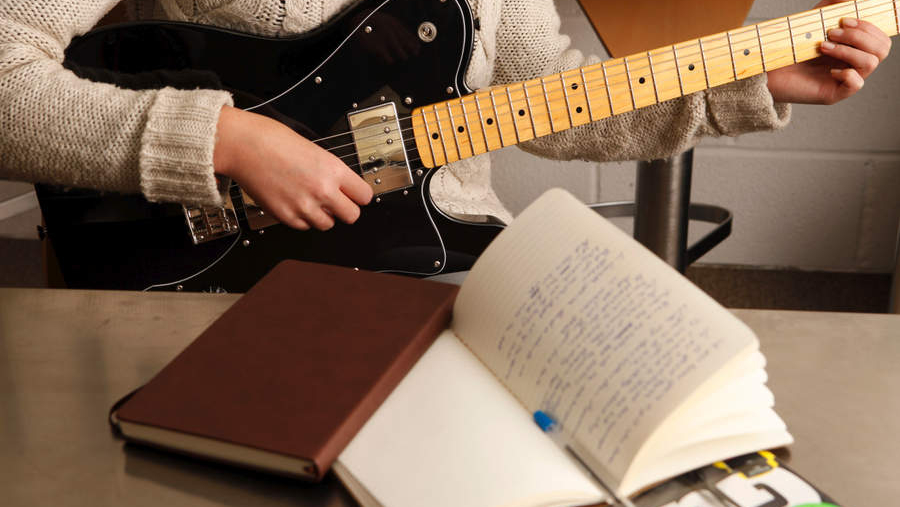
9. Music theory that’s all gain, no pain
Like it or not, to grow as a musician eventually you’re going to have to take a deep dive into music theory. There are a few ways of accomplishing this. You can assimilate it over many, many years of playing, or you can study books on theory, most of which are drier than the Atacama and just as impenetrable.
Alternatively, you can make learning theory relevant and fun by relying on your music teacher or app to drip-feed you small, relevant doses as you progress through your curriculum. This third way is by far the quickest and most palatable for most guitarists.
10. There’s a world of music out there for you to discover
If you’re lucky, you’ll sign up with a teacher who loves to share their broad knowledge of music by introducing you to as many different genres as possible. Not only will this expand your awareness, but it may also encourage you to play styles you wouldn’t ordinarily listen to.
We all gravitate to music that we’re most familiar with, which can quickly steer our playing into a rut. Playing something completely unexpected can be fun and a wonderful way to break free from our self-imposed rules of conformity. Love metal? Why not try bluegrass? It worked for John 5.
11. Let’s get social
For millennia, music has been largely a social activity – jamming together is not only fun, it’s well-proven to be good for our mental health. Taking lessons gives you the opportunity for social interaction and through your teacher, you may even be introduced to a wider circle of musicians.
If you suffer from performance anxiety, working with a teacher may provide you with a safe space in which to build your confidence. What’s more, if you want to reach your true potential as a guitarist who can improvise freely, then you’ve got to start playing with others. Your teacher could very well be the perfect jam partner.
New to guitar? Here’s our pick of the gear you need to get started
- Explore the best acoustic guitars for beginners
- Or plug in with the best beginner electric guitars
- The best guitars for kids: top electrics and acoustics for children
- Best beginner guitar amps: top guitar amplifiers for newbies
- Guitar accessories for beginners and beginner guitar gear essentials
When Simon's childhood classical guitar teacher boasted he 'enjoyed a challenge', the poor man had no idea how much he'd underestimated the scale of the task ahead. Despite Simon's lack of talent, the experience did spark a lifelong passion for music. His classical guitar was discarded for an electric, then a room full of electrics before Simon discovered the joys of keys. Against all odds, Simon somehow managed to blag a career as a fashion journalist, but he's now more suitably employed writing for Guitar World and MusicRadar. When not writing or playing, he can be found terrifying himself on his mountain bike.



![[from left] George Harrison with his Gretsch Country Gentleman, Norman Harris of Norman's Rare Guitars holds a gold-top Les Paul, John Fogerty with his legendary 1969 Rickenbacker](https://cdn.mos.cms.futurecdn.net/TuH3nuhn9etqjdn5sy4ntW.jpg)







